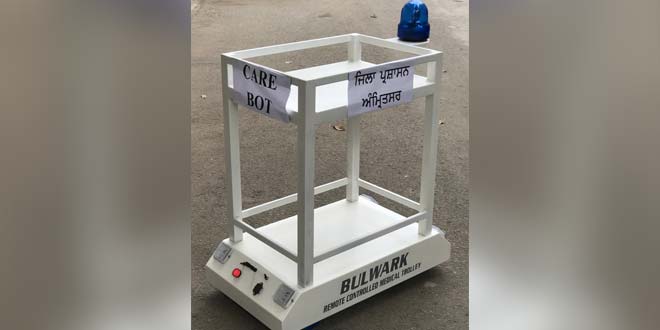Highlights
- Carebot, a remote controlled robotic trolley encourages physical distancing
- Carebot can go into wards, rooms and carry 40 kgs of weight
- Camera and microphone on Carebot will enable two-way communication
New Delhi: The outbreak of the Novel Coronavirus has introduced the world to the concept of social or physical distancing. The Centers for Disease Control and Prevention (CDC) from the United States asks to stay at least 6 feet (about 2 arms’ length) away from other people. In order to ensure the same practise is followed at a COVID-19 care center in Amritsar, ‘carebot’ – a robot has been deployed to assist doctors and other healthcare staff and thus maintain safe distance and avoid contracting the Coronavirus.
Also Read: Coronavirus In India: Experts Explain Different Types Of Tests For COVID-19 And Their Efficacy
Talking to NDTV about the initiative, Shivdular Singh Dhillon, Deputy Commissioner of Amritsar and the brain behind roping in a robotic device said,
COVID-19 care center hosts asymptomatic patients of COVID-19 and patients with mild symptoms of coronavirus. The idea of isolating them in a care center is to ensure the virus doesn’t spread. For the same, we talk about social distancing as well and in order to encourage that only we have devised this robotic service trolley – carebot.
The remote controlled robotic trolley helps in reducing the human to human interaction to the minimum. The carebot is capable of going into wards, rooms and carry 40 kgs of weight. The robotic trolley will be used in serving food, water, medicines to all the COVID-19 patients.
The administration is now working on the advancement of the carebot by adding a camera and microphone to it. Elaborating on the advanced features of carebot, Mr Dhillon said,
We are adding camera and microphone to it so that by sitting in the control room, the operator can interact with the patients; enabling two-way communication. Let’s say, a patient has some doubts or doesn’t want to take the medicine because it’s not suiting him/her or anything else. In that case, a patient can communicate the same to the operator through the microphone and camera. Also, if our robot is carrying the lunch and the patient is sleeping, the operator can make the announcement ‘your lunch is here’ and ask the patient to wake up and have his/her meal.
Mr Dhillon believes that the robotic device will help in three ways – ease the burden on healthcare staff; reduce a person to person interaction which is most desired during the coronavirus outbreak; keep patients engaged. Talking about how it will keep patients engaged, Mr Dhillon said,
Patients here don’t have anything to do and an item of novelty keeps people interested. If they will see something like this helping them, providing care to them, they will be entertained.
Currently, there is no patient in the COVID-19 care center comprising f we thousand beds. But since the trial runs and testing for carebot is completed, Mr Dhillon is confident of using it as and when need arise. Paralley, the team is constantly working on improving the robot.
[corona_data_new]





























